Leadership, Management, and Sustainability at The Ritz Hotel
VerifiedAdded on 2023/06/17
|16
|4636
|480
Report
AI Summary
This report provides a comprehensive analysis of leadership and management principles within the hospitality industry, using The Ritz Hotel in London as a case study. It reviews classical management theories, including those of Henri Fayol, Frederick Taylor, and Max Weber, and examines their applicability to the hospitality sector. The report discusses the roles of leaders and different leadership styles, such as democratic and autocratic leadership, evaluating their respective advantages and disadvantages. It also delves into sustainable management and leadership, addressing challenges and issues related to sustainable leadership in the hospitality industry. Furthermore, the report explores internal and external factors influencing sustainable leadership, assessing the strengths and weaknesses of these factors. It discusses hard and soft skills required for effective management and leadership, along with future skills needed in the service industry. Finally, the report compares change management systems across different service industries and analyzes the impact of change management on leadership skills, highlighting key challenges and obstacles in sustainable change management.
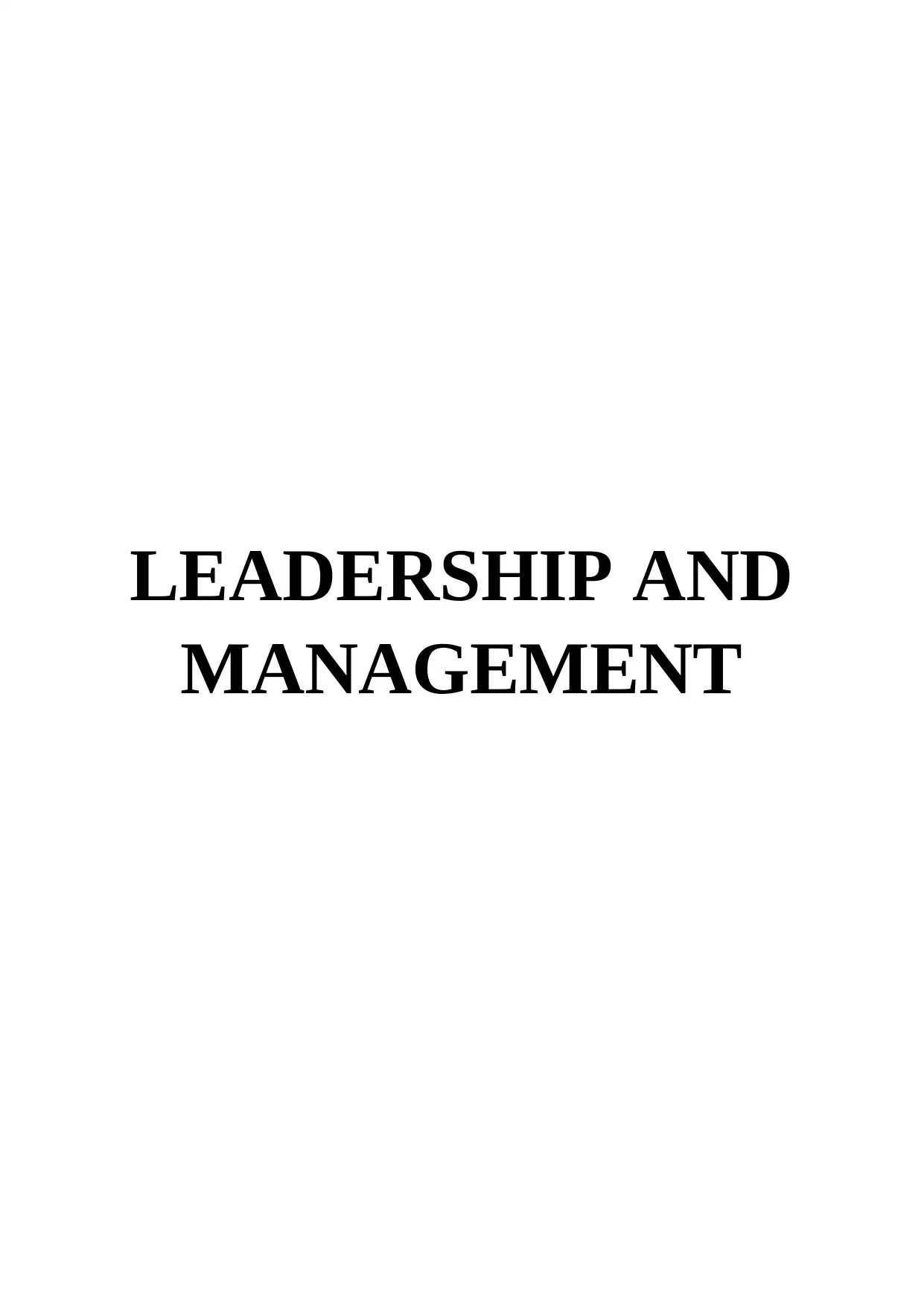
LEADERSHIP AND
MANAGEMENT
MANAGEMENT
Paraphrase This Document
Need a fresh take? Get an instant paraphrase of this document with our AI Paraphraser
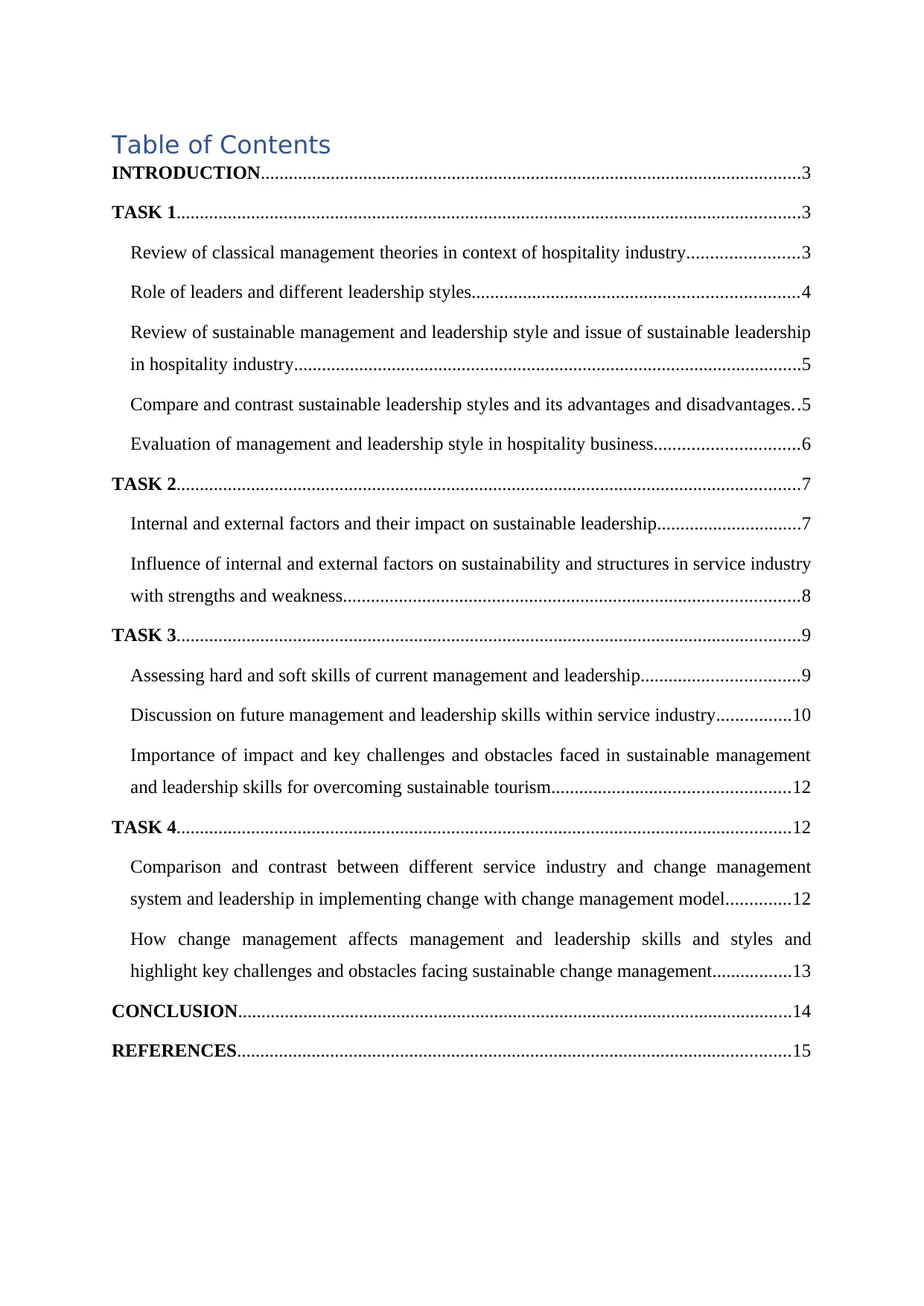
Table of Contents
INTRODUCTION....................................................................................................................3
TASK 1......................................................................................................................................3
Review of classical management theories in context of hospitality industry........................3
Role of leaders and different leadership styles......................................................................4
Review of sustainable management and leadership style and issue of sustainable leadership
in hospitality industry.............................................................................................................5
Compare and contrast sustainable leadership styles and its advantages and disadvantages..5
Evaluation of management and leadership style in hospitality business...............................6
TASK 2......................................................................................................................................7
Internal and external factors and their impact on sustainable leadership...............................7
Influence of internal and external factors on sustainability and structures in service industry
with strengths and weakness..................................................................................................8
TASK 3......................................................................................................................................9
Assessing hard and soft skills of current management and leadership..................................9
Discussion on future management and leadership skills within service industry................10
Importance of impact and key challenges and obstacles faced in sustainable management
and leadership skills for overcoming sustainable tourism...................................................12
TASK 4....................................................................................................................................12
Comparison and contrast between different service industry and change management
system and leadership in implementing change with change management model..............12
How change management affects management and leadership skills and styles and
highlight key challenges and obstacles facing sustainable change management.................13
CONCLUSION.......................................................................................................................14
REFERENCES.......................................................................................................................15
INTRODUCTION....................................................................................................................3
TASK 1......................................................................................................................................3
Review of classical management theories in context of hospitality industry........................3
Role of leaders and different leadership styles......................................................................4
Review of sustainable management and leadership style and issue of sustainable leadership
in hospitality industry.............................................................................................................5
Compare and contrast sustainable leadership styles and its advantages and disadvantages..5
Evaluation of management and leadership style in hospitality business...............................6
TASK 2......................................................................................................................................7
Internal and external factors and their impact on sustainable leadership...............................7
Influence of internal and external factors on sustainability and structures in service industry
with strengths and weakness..................................................................................................8
TASK 3......................................................................................................................................9
Assessing hard and soft skills of current management and leadership..................................9
Discussion on future management and leadership skills within service industry................10
Importance of impact and key challenges and obstacles faced in sustainable management
and leadership skills for overcoming sustainable tourism...................................................12
TASK 4....................................................................................................................................12
Comparison and contrast between different service industry and change management
system and leadership in implementing change with change management model..............12
How change management affects management and leadership skills and styles and
highlight key challenges and obstacles facing sustainable change management.................13
CONCLUSION.......................................................................................................................14
REFERENCES.......................................................................................................................15
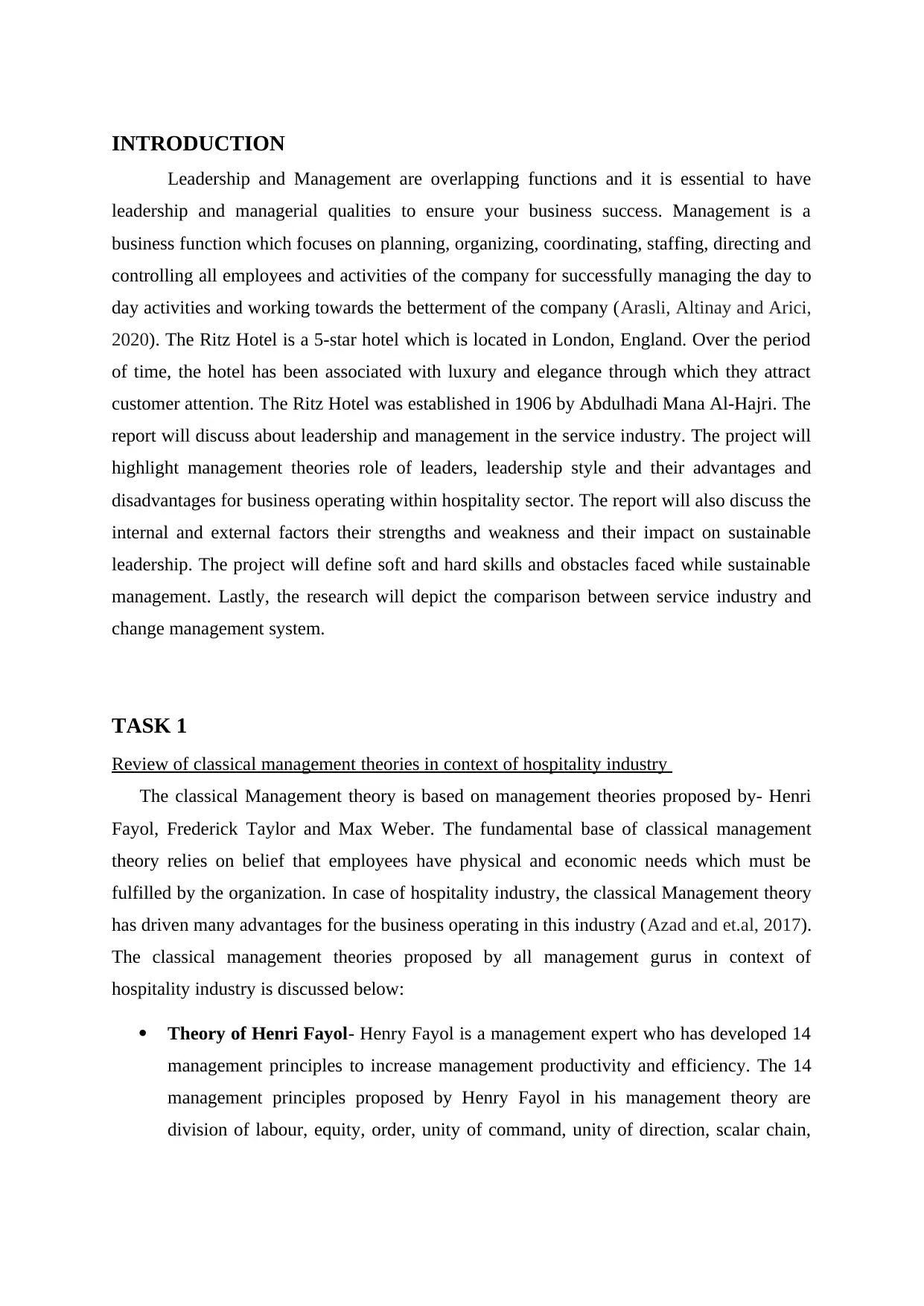
INTRODUCTION
Leadership and Management are overlapping functions and it is essential to have
leadership and managerial qualities to ensure your business success. Management is a
business function which focuses on planning, organizing, coordinating, staffing, directing and
controlling all employees and activities of the company for successfully managing the day to
day activities and working towards the betterment of the company (Arasli, Altinay and Arici,
2020). The Ritz Hotel is a 5-star hotel which is located in London, England. Over the period
of time, the hotel has been associated with luxury and elegance through which they attract
customer attention. The Ritz Hotel was established in 1906 by Abdulhadi Mana Al-Hajri. The
report will discuss about leadership and management in the service industry. The project will
highlight management theories role of leaders, leadership style and their advantages and
disadvantages for business operating within hospitality sector. The report will also discuss the
internal and external factors their strengths and weakness and their impact on sustainable
leadership. The project will define soft and hard skills and obstacles faced while sustainable
management. Lastly, the research will depict the comparison between service industry and
change management system.
TASK 1
Review of classical management theories in context of hospitality industry
The classical Management theory is based on management theories proposed by- Henri
Fayol, Frederick Taylor and Max Weber. The fundamental base of classical management
theory relies on belief that employees have physical and economic needs which must be
fulfilled by the organization. In case of hospitality industry, the classical Management theory
has driven many advantages for the business operating in this industry (Azad and et.al, 2017).
The classical management theories proposed by all management gurus in context of
hospitality industry is discussed below:
Theory of Henri Fayol- Henry Fayol is a management expert who has developed 14
management principles to increase management productivity and efficiency. The 14
management principles proposed by Henry Fayol in his management theory are
division of labour, equity, order, unity of command, unity of direction, scalar chain,
Leadership and Management are overlapping functions and it is essential to have
leadership and managerial qualities to ensure your business success. Management is a
business function which focuses on planning, organizing, coordinating, staffing, directing and
controlling all employees and activities of the company for successfully managing the day to
day activities and working towards the betterment of the company (Arasli, Altinay and Arici,
2020). The Ritz Hotel is a 5-star hotel which is located in London, England. Over the period
of time, the hotel has been associated with luxury and elegance through which they attract
customer attention. The Ritz Hotel was established in 1906 by Abdulhadi Mana Al-Hajri. The
report will discuss about leadership and management in the service industry. The project will
highlight management theories role of leaders, leadership style and their advantages and
disadvantages for business operating within hospitality sector. The report will also discuss the
internal and external factors their strengths and weakness and their impact on sustainable
leadership. The project will define soft and hard skills and obstacles faced while sustainable
management. Lastly, the research will depict the comparison between service industry and
change management system.
TASK 1
Review of classical management theories in context of hospitality industry
The classical Management theory is based on management theories proposed by- Henri
Fayol, Frederick Taylor and Max Weber. The fundamental base of classical management
theory relies on belief that employees have physical and economic needs which must be
fulfilled by the organization. In case of hospitality industry, the classical Management theory
has driven many advantages for the business operating in this industry (Azad and et.al, 2017).
The classical management theories proposed by all management gurus in context of
hospitality industry is discussed below:
Theory of Henri Fayol- Henry Fayol is a management expert who has developed 14
management principles to increase management productivity and efficiency. The 14
management principles proposed by Henry Fayol in his management theory are
division of labour, equity, order, unity of command, unity of direction, scalar chain,
⊘ This is a preview!⊘
Do you want full access?
Subscribe today to unlock all pages.

Trusted by 1+ million students worldwide
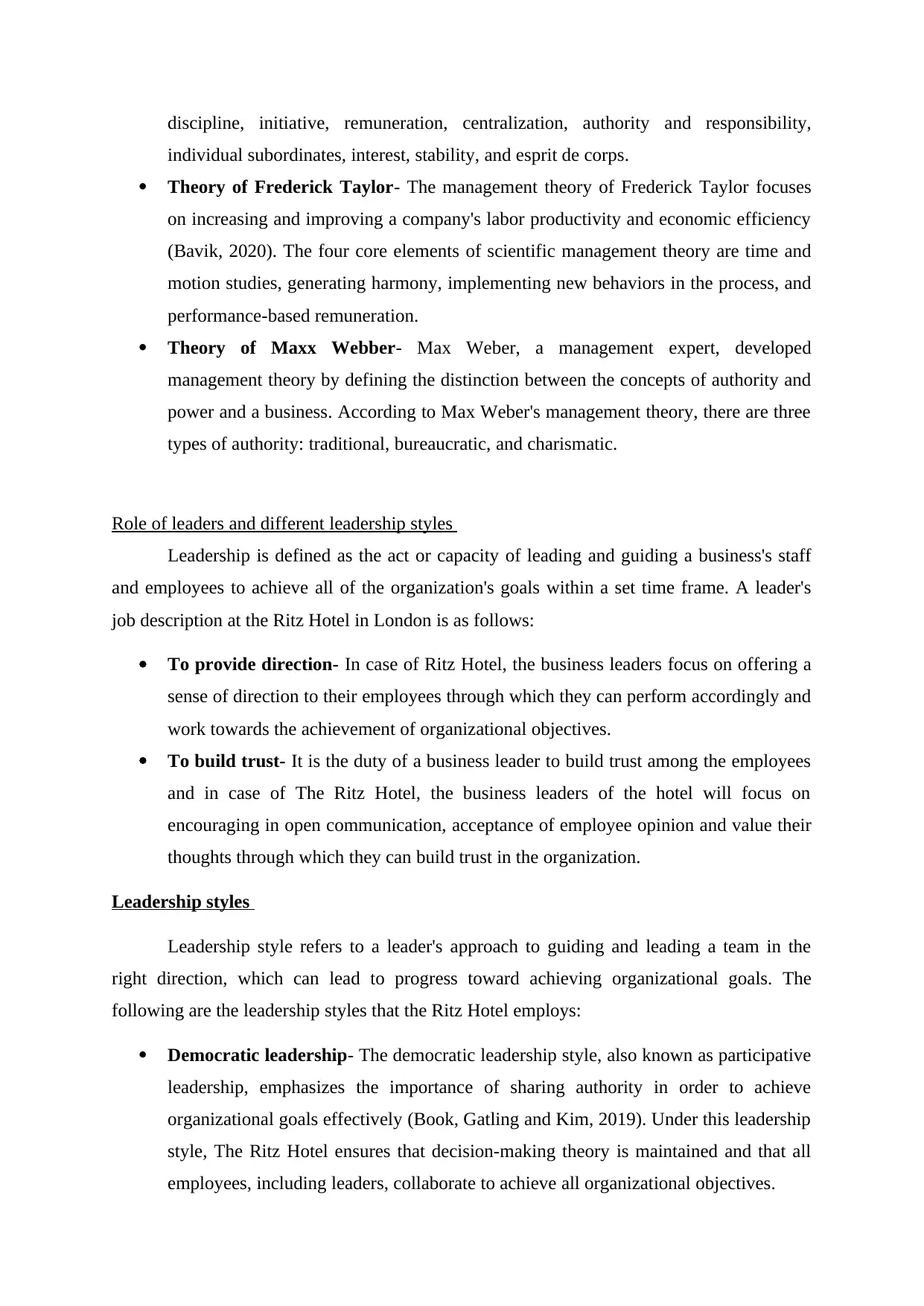
discipline, initiative, remuneration, centralization, authority and responsibility,
individual subordinates, interest, stability, and esprit de corps.
Theory of Frederick Taylor- The management theory of Frederick Taylor focuses
on increasing and improving a company's labor productivity and economic efficiency
(Bavik, 2020). The four core elements of scientific management theory are time and
motion studies, generating harmony, implementing new behaviors in the process, and
performance-based remuneration.
Theory of Maxx Webber- Max Weber, a management expert, developed
management theory by defining the distinction between the concepts of authority and
power and a business. According to Max Weber's management theory, there are three
types of authority: traditional, bureaucratic, and charismatic.
Role of leaders and different leadership styles
Leadership is defined as the act or capacity of leading and guiding a business's staff
and employees to achieve all of the organization's goals within a set time frame. A leader's
job description at the Ritz Hotel in London is as follows:
To provide direction- In case of Ritz Hotel, the business leaders focus on offering a
sense of direction to their employees through which they can perform accordingly and
work towards the achievement of organizational objectives.
To build trust- It is the duty of a business leader to build trust among the employees
and in case of The Ritz Hotel, the business leaders of the hotel will focus on
encouraging in open communication, acceptance of employee opinion and value their
thoughts through which they can build trust in the organization.
Leadership styles
Leadership style refers to a leader's approach to guiding and leading a team in the
right direction, which can lead to progress toward achieving organizational goals. The
following are the leadership styles that the Ritz Hotel employs:
Democratic leadership- The democratic leadership style, also known as participative
leadership, emphasizes the importance of sharing authority in order to achieve
organizational goals effectively (Book, Gatling and Kim, 2019). Under this leadership
style, The Ritz Hotel ensures that decision-making theory is maintained and that all
employees, including leaders, collaborate to achieve all organizational objectives.
individual subordinates, interest, stability, and esprit de corps.
Theory of Frederick Taylor- The management theory of Frederick Taylor focuses
on increasing and improving a company's labor productivity and economic efficiency
(Bavik, 2020). The four core elements of scientific management theory are time and
motion studies, generating harmony, implementing new behaviors in the process, and
performance-based remuneration.
Theory of Maxx Webber- Max Weber, a management expert, developed
management theory by defining the distinction between the concepts of authority and
power and a business. According to Max Weber's management theory, there are three
types of authority: traditional, bureaucratic, and charismatic.
Role of leaders and different leadership styles
Leadership is defined as the act or capacity of leading and guiding a business's staff
and employees to achieve all of the organization's goals within a set time frame. A leader's
job description at the Ritz Hotel in London is as follows:
To provide direction- In case of Ritz Hotel, the business leaders focus on offering a
sense of direction to their employees through which they can perform accordingly and
work towards the achievement of organizational objectives.
To build trust- It is the duty of a business leader to build trust among the employees
and in case of The Ritz Hotel, the business leaders of the hotel will focus on
encouraging in open communication, acceptance of employee opinion and value their
thoughts through which they can build trust in the organization.
Leadership styles
Leadership style refers to a leader's approach to guiding and leading a team in the
right direction, which can lead to progress toward achieving organizational goals. The
following are the leadership styles that the Ritz Hotel employs:
Democratic leadership- The democratic leadership style, also known as participative
leadership, emphasizes the importance of sharing authority in order to achieve
organizational goals effectively (Book, Gatling and Kim, 2019). Under this leadership
style, The Ritz Hotel ensures that decision-making theory is maintained and that all
employees, including leaders, collaborate to achieve all organizational objectives.
Paraphrase This Document
Need a fresh take? Get an instant paraphrase of this document with our AI Paraphraser
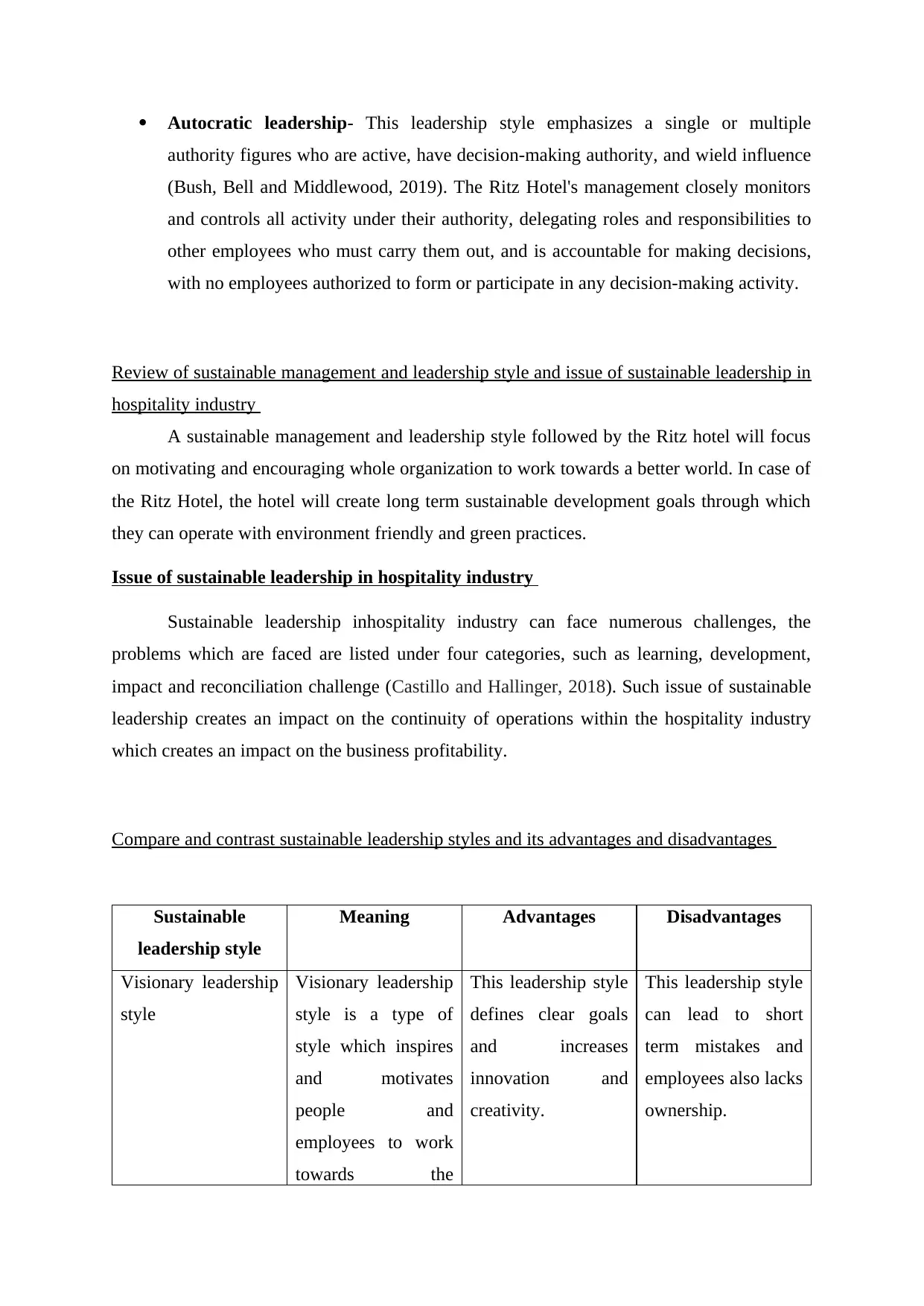
Autocratic leadership- This leadership style emphasizes a single or multiple
authority figures who are active, have decision-making authority, and wield influence
(Bush, Bell and Middlewood, 2019). The Ritz Hotel's management closely monitors
and controls all activity under their authority, delegating roles and responsibilities to
other employees who must carry them out, and is accountable for making decisions,
with no employees authorized to form or participate in any decision-making activity.
Review of sustainable management and leadership style and issue of sustainable leadership in
hospitality industry
A sustainable management and leadership style followed by the Ritz hotel will focus
on motivating and encouraging whole organization to work towards a better world. In case of
the Ritz Hotel, the hotel will create long term sustainable development goals through which
they can operate with environment friendly and green practices.
Issue of sustainable leadership in hospitality industry
Sustainable leadership inhospitality industry can face numerous challenges, the
problems which are faced are listed under four categories, such as learning, development,
impact and reconciliation challenge (Castillo and Hallinger, 2018). Such issue of sustainable
leadership creates an impact on the continuity of operations within the hospitality industry
which creates an impact on the business profitability.
Compare and contrast sustainable leadership styles and its advantages and disadvantages
Sustainable
leadership style
Meaning Advantages Disadvantages
Visionary leadership
style
Visionary leadership
style is a type of
style which inspires
and motivates
people and
employees to work
towards the
This leadership style
defines clear goals
and increases
innovation and
creativity.
This leadership style
can lead to short
term mistakes and
employees also lacks
ownership.
authority figures who are active, have decision-making authority, and wield influence
(Bush, Bell and Middlewood, 2019). The Ritz Hotel's management closely monitors
and controls all activity under their authority, delegating roles and responsibilities to
other employees who must carry them out, and is accountable for making decisions,
with no employees authorized to form or participate in any decision-making activity.
Review of sustainable management and leadership style and issue of sustainable leadership in
hospitality industry
A sustainable management and leadership style followed by the Ritz hotel will focus
on motivating and encouraging whole organization to work towards a better world. In case of
the Ritz Hotel, the hotel will create long term sustainable development goals through which
they can operate with environment friendly and green practices.
Issue of sustainable leadership in hospitality industry
Sustainable leadership inhospitality industry can face numerous challenges, the
problems which are faced are listed under four categories, such as learning, development,
impact and reconciliation challenge (Castillo and Hallinger, 2018). Such issue of sustainable
leadership creates an impact on the continuity of operations within the hospitality industry
which creates an impact on the business profitability.
Compare and contrast sustainable leadership styles and its advantages and disadvantages
Sustainable
leadership style
Meaning Advantages Disadvantages
Visionary leadership
style
Visionary leadership
style is a type of
style which inspires
and motivates
people and
employees to work
towards the
This leadership style
defines clear goals
and increases
innovation and
creativity.
This leadership style
can lead to short
term mistakes and
employees also lacks
ownership.
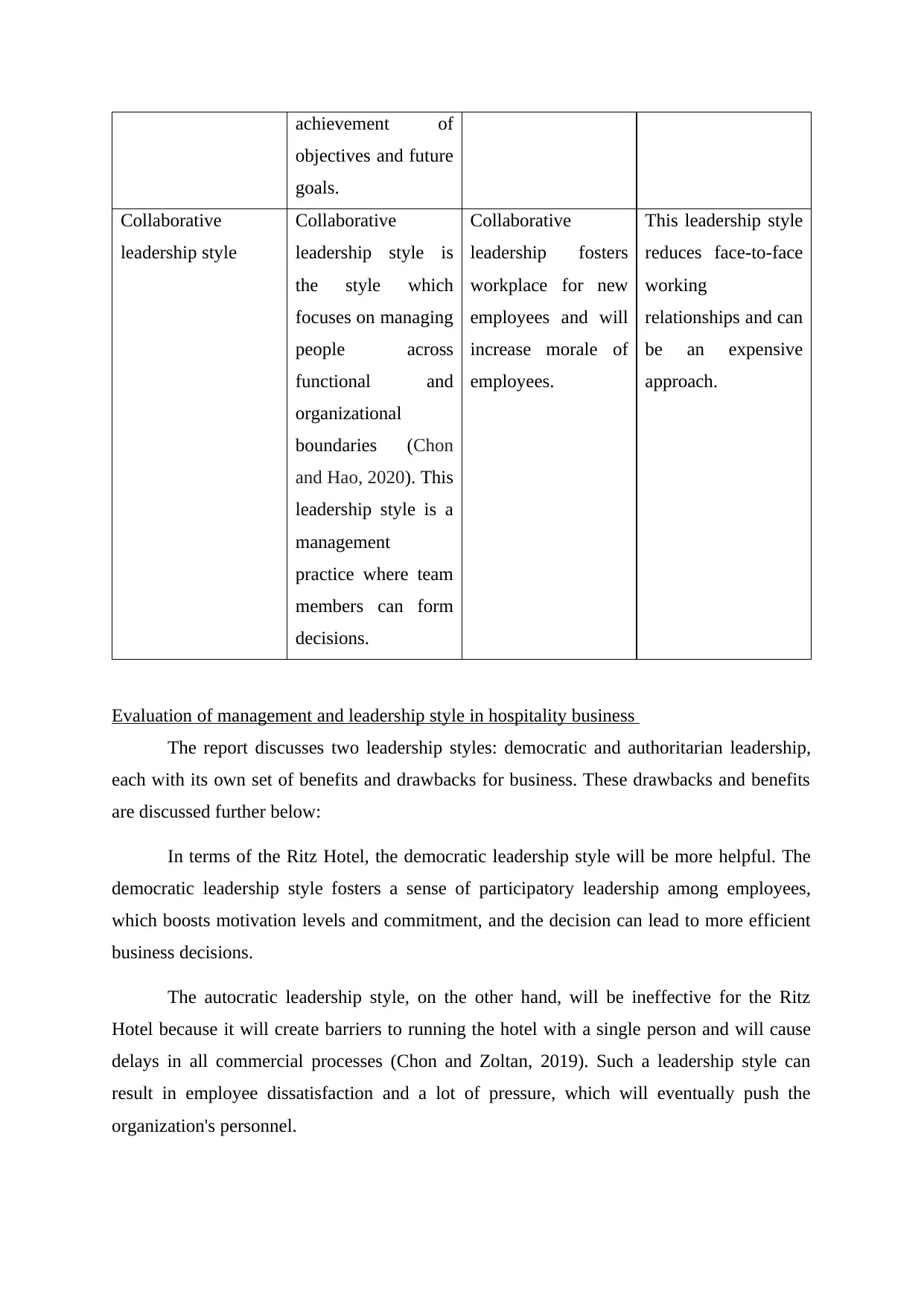
achievement of
objectives and future
goals.
Collaborative
leadership style
Collaborative
leadership style is
the style which
focuses on managing
people across
functional and
organizational
boundaries (Chon
and Hao, 2020). This
leadership style is a
management
practice where team
members can form
decisions.
Collaborative
leadership fosters
workplace for new
employees and will
increase morale of
employees.
This leadership style
reduces face-to-face
working
relationships and can
be an expensive
approach.
Evaluation of management and leadership style in hospitality business
The report discusses two leadership styles: democratic and authoritarian leadership,
each with its own set of benefits and drawbacks for business. These drawbacks and benefits
are discussed further below:
In terms of the Ritz Hotel, the democratic leadership style will be more helpful. The
democratic leadership style fosters a sense of participatory leadership among employees,
which boosts motivation levels and commitment, and the decision can lead to more efficient
business decisions.
The autocratic leadership style, on the other hand, will be ineffective for the Ritz
Hotel because it will create barriers to running the hotel with a single person and will cause
delays in all commercial processes (Chon and Zoltan, 2019). Such a leadership style can
result in employee dissatisfaction and a lot of pressure, which will eventually push the
organization's personnel.
objectives and future
goals.
Collaborative
leadership style
Collaborative
leadership style is
the style which
focuses on managing
people across
functional and
organizational
boundaries (Chon
and Hao, 2020). This
leadership style is a
management
practice where team
members can form
decisions.
Collaborative
leadership fosters
workplace for new
employees and will
increase morale of
employees.
This leadership style
reduces face-to-face
working
relationships and can
be an expensive
approach.
Evaluation of management and leadership style in hospitality business
The report discusses two leadership styles: democratic and authoritarian leadership,
each with its own set of benefits and drawbacks for business. These drawbacks and benefits
are discussed further below:
In terms of the Ritz Hotel, the democratic leadership style will be more helpful. The
democratic leadership style fosters a sense of participatory leadership among employees,
which boosts motivation levels and commitment, and the decision can lead to more efficient
business decisions.
The autocratic leadership style, on the other hand, will be ineffective for the Ritz
Hotel because it will create barriers to running the hotel with a single person and will cause
delays in all commercial processes (Chon and Zoltan, 2019). Such a leadership style can
result in employee dissatisfaction and a lot of pressure, which will eventually push the
organization's personnel.
⊘ This is a preview!⊘
Do you want full access?
Subscribe today to unlock all pages.

Trusted by 1+ million students worldwide
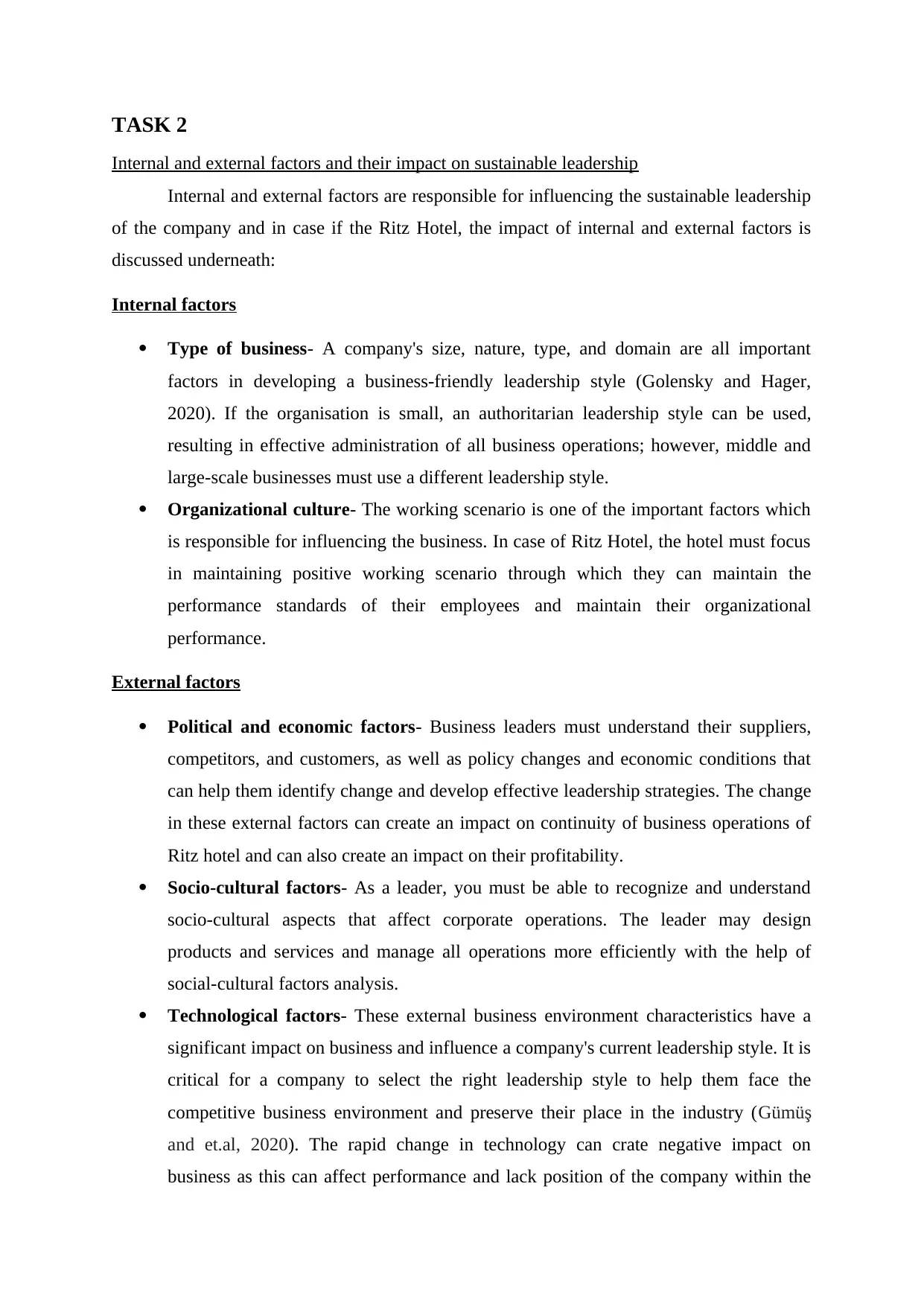
TASK 2
Internal and external factors and their impact on sustainable leadership
Internal and external factors are responsible for influencing the sustainable leadership
of the company and in case if the Ritz Hotel, the impact of internal and external factors is
discussed underneath:
Internal factors
Type of business- A company's size, nature, type, and domain are all important
factors in developing a business-friendly leadership style (Golensky and Hager,
2020). If the organisation is small, an authoritarian leadership style can be used,
resulting in effective administration of all business operations; however, middle and
large-scale businesses must use a different leadership style.
Organizational culture- The working scenario is one of the important factors which
is responsible for influencing the business. In case of Ritz Hotel, the hotel must focus
in maintaining positive working scenario through which they can maintain the
performance standards of their employees and maintain their organizational
performance.
External factors
Political and economic factors- Business leaders must understand their suppliers,
competitors, and customers, as well as policy changes and economic conditions that
can help them identify change and develop effective leadership strategies. The change
in these external factors can create an impact on continuity of business operations of
Ritz hotel and can also create an impact on their profitability.
Socio-cultural factors- As a leader, you must be able to recognize and understand
socio-cultural aspects that affect corporate operations. The leader may design
products and services and manage all operations more efficiently with the help of
social-cultural factors analysis.
Technological factors- These external business environment characteristics have a
significant impact on business and influence a company's current leadership style. It is
critical for a company to select the right leadership style to help them face the
competitive business environment and preserve their place in the industry (Gümüş
and et.al, 2020). The rapid change in technology can crate negative impact on
business as this can affect performance and lack position of the company within the
Internal and external factors and their impact on sustainable leadership
Internal and external factors are responsible for influencing the sustainable leadership
of the company and in case if the Ritz Hotel, the impact of internal and external factors is
discussed underneath:
Internal factors
Type of business- A company's size, nature, type, and domain are all important
factors in developing a business-friendly leadership style (Golensky and Hager,
2020). If the organisation is small, an authoritarian leadership style can be used,
resulting in effective administration of all business operations; however, middle and
large-scale businesses must use a different leadership style.
Organizational culture- The working scenario is one of the important factors which
is responsible for influencing the business. In case of Ritz Hotel, the hotel must focus
in maintaining positive working scenario through which they can maintain the
performance standards of their employees and maintain their organizational
performance.
External factors
Political and economic factors- Business leaders must understand their suppliers,
competitors, and customers, as well as policy changes and economic conditions that
can help them identify change and develop effective leadership strategies. The change
in these external factors can create an impact on continuity of business operations of
Ritz hotel and can also create an impact on their profitability.
Socio-cultural factors- As a leader, you must be able to recognize and understand
socio-cultural aspects that affect corporate operations. The leader may design
products and services and manage all operations more efficiently with the help of
social-cultural factors analysis.
Technological factors- These external business environment characteristics have a
significant impact on business and influence a company's current leadership style. It is
critical for a company to select the right leadership style to help them face the
competitive business environment and preserve their place in the industry (Gümüş
and et.al, 2020). The rapid change in technology can crate negative impact on
business as this can affect performance and lack position of the company within the
Paraphrase This Document
Need a fresh take? Get an instant paraphrase of this document with our AI Paraphraser
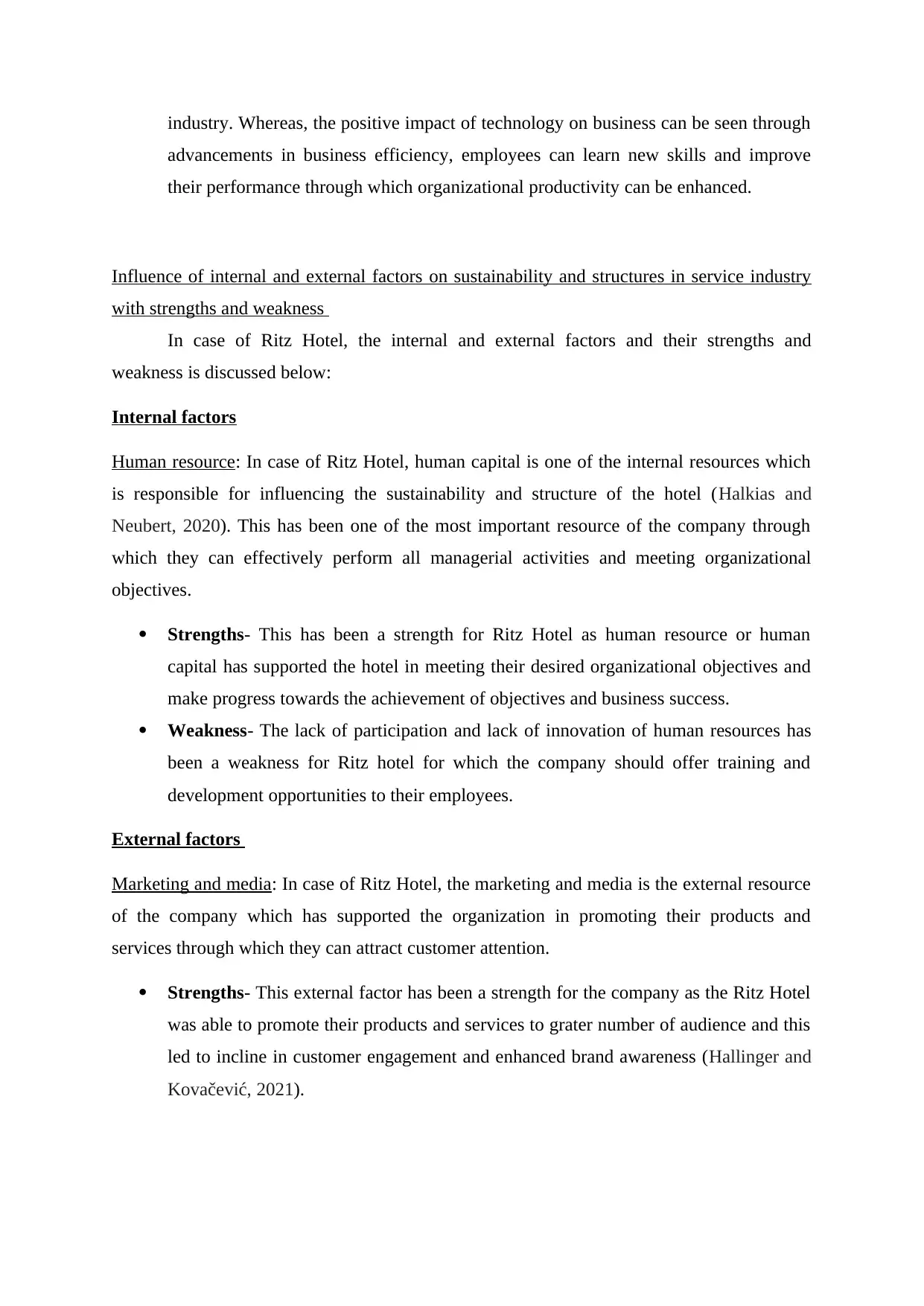
industry. Whereas, the positive impact of technology on business can be seen through
advancements in business efficiency, employees can learn new skills and improve
their performance through which organizational productivity can be enhanced.
Influence of internal and external factors on sustainability and structures in service industry
with strengths and weakness
In case of Ritz Hotel, the internal and external factors and their strengths and
weakness is discussed below:
Internal factors
Human resource: In case of Ritz Hotel, human capital is one of the internal resources which
is responsible for influencing the sustainability and structure of the hotel (Halkias and
Neubert, 2020). This has been one of the most important resource of the company through
which they can effectively perform all managerial activities and meeting organizational
objectives.
Strengths- This has been a strength for Ritz Hotel as human resource or human
capital has supported the hotel in meeting their desired organizational objectives and
make progress towards the achievement of objectives and business success.
Weakness- The lack of participation and lack of innovation of human resources has
been a weakness for Ritz hotel for which the company should offer training and
development opportunities to their employees.
External factors
Marketing and media: In case of Ritz Hotel, the marketing and media is the external resource
of the company which has supported the organization in promoting their products and
services through which they can attract customer attention.
Strengths- This external factor has been a strength for the company as the Ritz Hotel
was able to promote their products and services to grater number of audience and this
led to incline in customer engagement and enhanced brand awareness (Hallinger and
Kovačević, 2021).
advancements in business efficiency, employees can learn new skills and improve
their performance through which organizational productivity can be enhanced.
Influence of internal and external factors on sustainability and structures in service industry
with strengths and weakness
In case of Ritz Hotel, the internal and external factors and their strengths and
weakness is discussed below:
Internal factors
Human resource: In case of Ritz Hotel, human capital is one of the internal resources which
is responsible for influencing the sustainability and structure of the hotel (Halkias and
Neubert, 2020). This has been one of the most important resource of the company through
which they can effectively perform all managerial activities and meeting organizational
objectives.
Strengths- This has been a strength for Ritz Hotel as human resource or human
capital has supported the hotel in meeting their desired organizational objectives and
make progress towards the achievement of objectives and business success.
Weakness- The lack of participation and lack of innovation of human resources has
been a weakness for Ritz hotel for which the company should offer training and
development opportunities to their employees.
External factors
Marketing and media: In case of Ritz Hotel, the marketing and media is the external resource
of the company which has supported the organization in promoting their products and
services through which they can attract customer attention.
Strengths- This external factor has been a strength for the company as the Ritz Hotel
was able to promote their products and services to grater number of audience and this
led to incline in customer engagement and enhanced brand awareness (Hallinger and
Kovačević, 2021).
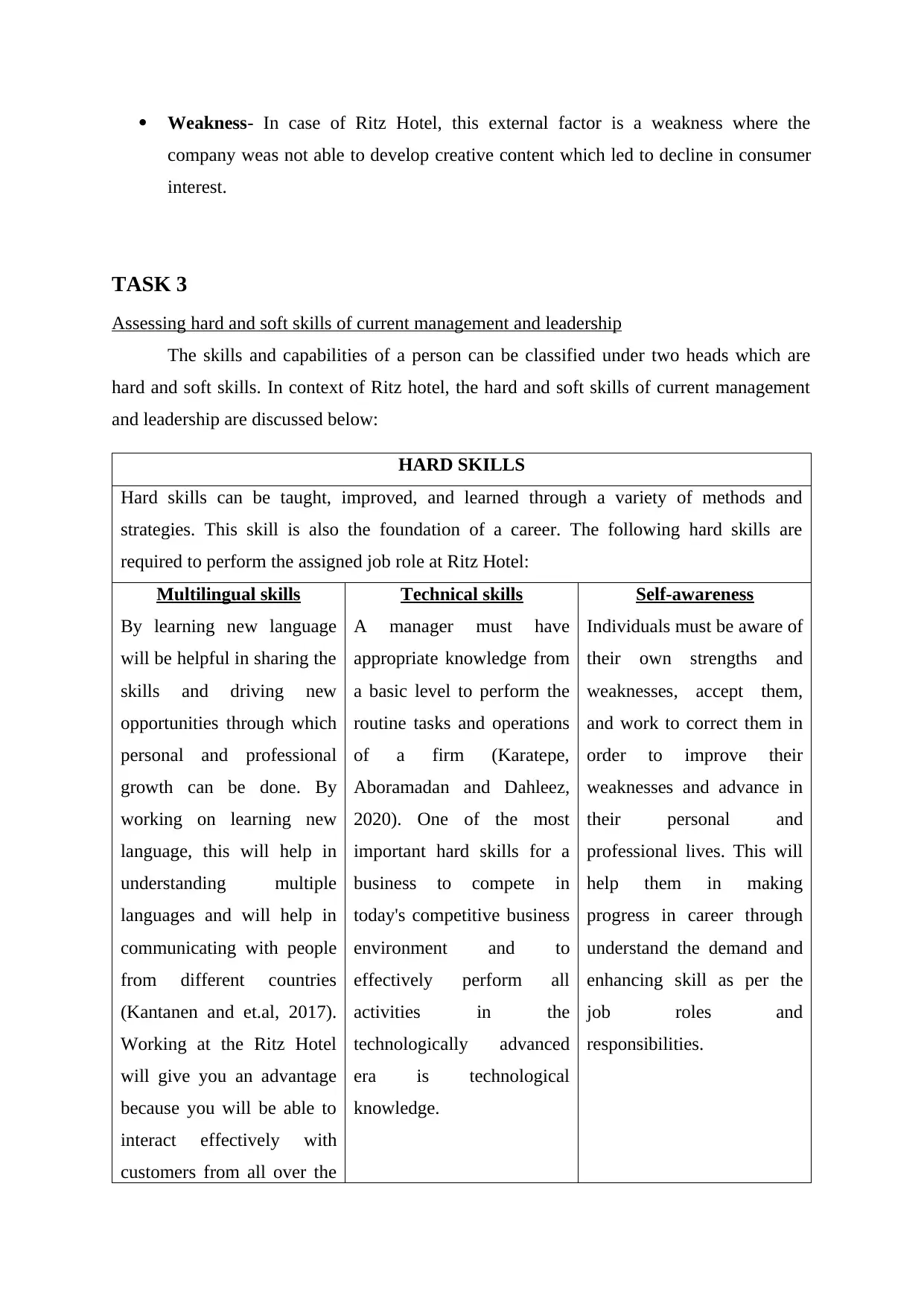
Weakness- In case of Ritz Hotel, this external factor is a weakness where the
company weas not able to develop creative content which led to decline in consumer
interest.
TASK 3
Assessing hard and soft skills of current management and leadership
The skills and capabilities of a person can be classified under two heads which are
hard and soft skills. In context of Ritz hotel, the hard and soft skills of current management
and leadership are discussed below:
HARD SKILLS
Hard skills can be taught, improved, and learned through a variety of methods and
strategies. This skill is also the foundation of a career. The following hard skills are
required to perform the assigned job role at Ritz Hotel:
Multilingual skills
By learning new language
will be helpful in sharing the
skills and driving new
opportunities through which
personal and professional
growth can be done. By
working on learning new
language, this will help in
understanding multiple
languages and will help in
communicating with people
from different countries
(Kantanen and et.al, 2017).
Working at the Ritz Hotel
will give you an advantage
because you will be able to
interact effectively with
customers from all over the
Technical skills
A manager must have
appropriate knowledge from
a basic level to perform the
routine tasks and operations
of a firm (Karatepe,
Aboramadan and Dahleez,
2020). One of the most
important hard skills for a
business to compete in
today's competitive business
environment and to
effectively perform all
activities in the
technologically advanced
era is technological
knowledge.
Self-awareness
Individuals must be aware of
their own strengths and
weaknesses, accept them,
and work to correct them in
order to improve their
weaknesses and advance in
their personal and
professional lives. This will
help them in making
progress in career through
understand the demand and
enhancing skill as per the
job roles and
responsibilities.
company weas not able to develop creative content which led to decline in consumer
interest.
TASK 3
Assessing hard and soft skills of current management and leadership
The skills and capabilities of a person can be classified under two heads which are
hard and soft skills. In context of Ritz hotel, the hard and soft skills of current management
and leadership are discussed below:
HARD SKILLS
Hard skills can be taught, improved, and learned through a variety of methods and
strategies. This skill is also the foundation of a career. The following hard skills are
required to perform the assigned job role at Ritz Hotel:
Multilingual skills
By learning new language
will be helpful in sharing the
skills and driving new
opportunities through which
personal and professional
growth can be done. By
working on learning new
language, this will help in
understanding multiple
languages and will help in
communicating with people
from different countries
(Kantanen and et.al, 2017).
Working at the Ritz Hotel
will give you an advantage
because you will be able to
interact effectively with
customers from all over the
Technical skills
A manager must have
appropriate knowledge from
a basic level to perform the
routine tasks and operations
of a firm (Karatepe,
Aboramadan and Dahleez,
2020). One of the most
important hard skills for a
business to compete in
today's competitive business
environment and to
effectively perform all
activities in the
technologically advanced
era is technological
knowledge.
Self-awareness
Individuals must be aware of
their own strengths and
weaknesses, accept them,
and work to correct them in
order to improve their
weaknesses and advance in
their personal and
professional lives. This will
help them in making
progress in career through
understand the demand and
enhancing skill as per the
job roles and
responsibilities.
⊘ This is a preview!⊘
Do you want full access?
Subscribe today to unlock all pages.

Trusted by 1+ million students worldwide
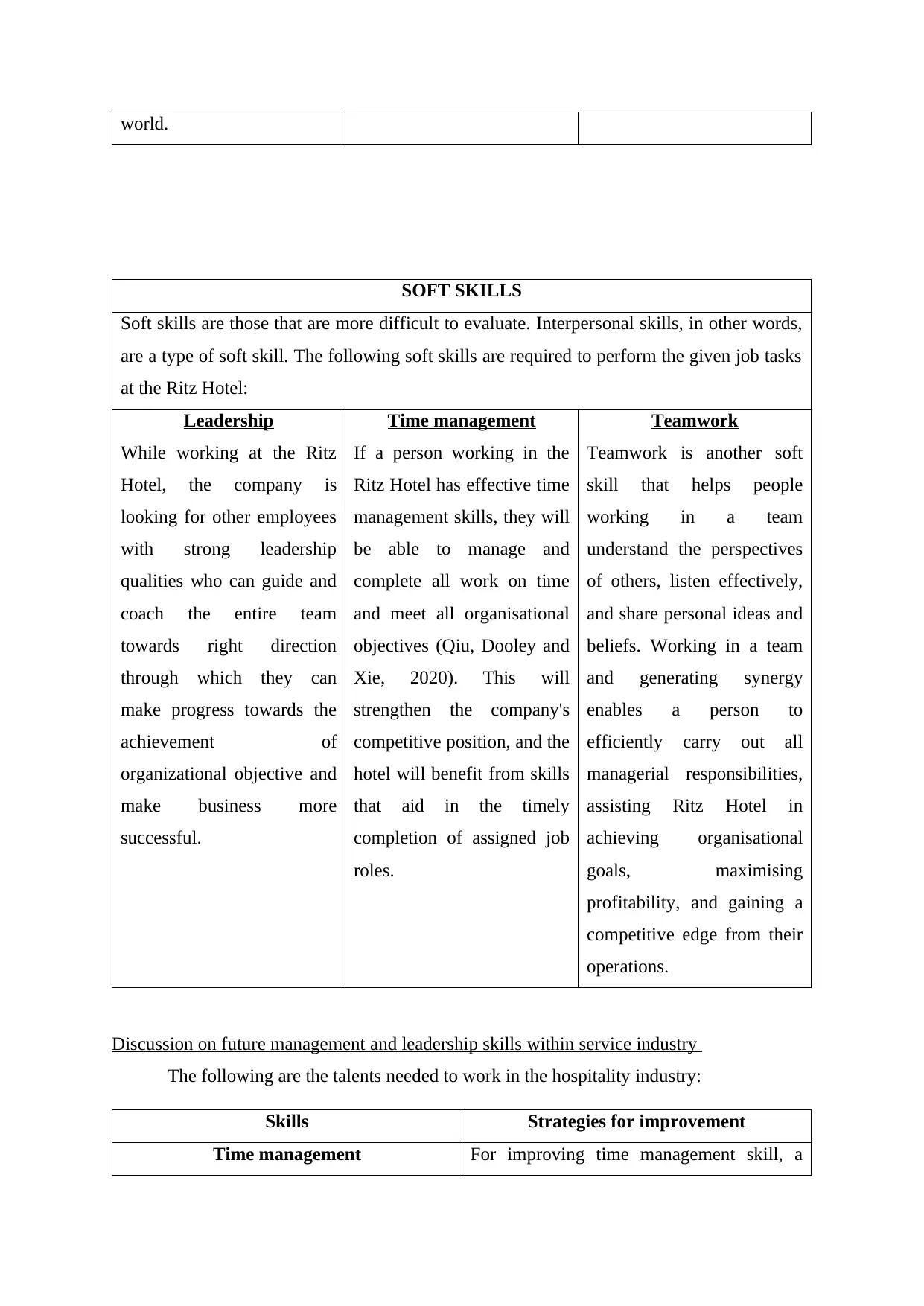
world.
SOFT SKILLS
Soft skills are those that are more difficult to evaluate. Interpersonal skills, in other words,
are a type of soft skill. The following soft skills are required to perform the given job tasks
at the Ritz Hotel:
Leadership
While working at the Ritz
Hotel, the company is
looking for other employees
with strong leadership
qualities who can guide and
coach the entire team
towards right direction
through which they can
make progress towards the
achievement of
organizational objective and
make business more
successful.
Time management
If a person working in the
Ritz Hotel has effective time
management skills, they will
be able to manage and
complete all work on time
and meet all organisational
objectives (Qiu, Dooley and
Xie, 2020). This will
strengthen the company's
competitive position, and the
hotel will benefit from skills
that aid in the timely
completion of assigned job
roles.
Teamwork
Teamwork is another soft
skill that helps people
working in a team
understand the perspectives
of others, listen effectively,
and share personal ideas and
beliefs. Working in a team
and generating synergy
enables a person to
efficiently carry out all
managerial responsibilities,
assisting Ritz Hotel in
achieving organisational
goals, maximising
profitability, and gaining a
competitive edge from their
operations.
Discussion on future management and leadership skills within service industry
The following are the talents needed to work in the hospitality industry:
Skills Strategies for improvement
Time management For improving time management skill, a
SOFT SKILLS
Soft skills are those that are more difficult to evaluate. Interpersonal skills, in other words,
are a type of soft skill. The following soft skills are required to perform the given job tasks
at the Ritz Hotel:
Leadership
While working at the Ritz
Hotel, the company is
looking for other employees
with strong leadership
qualities who can guide and
coach the entire team
towards right direction
through which they can
make progress towards the
achievement of
organizational objective and
make business more
successful.
Time management
If a person working in the
Ritz Hotel has effective time
management skills, they will
be able to manage and
complete all work on time
and meet all organisational
objectives (Qiu, Dooley and
Xie, 2020). This will
strengthen the company's
competitive position, and the
hotel will benefit from skills
that aid in the timely
completion of assigned job
roles.
Teamwork
Teamwork is another soft
skill that helps people
working in a team
understand the perspectives
of others, listen effectively,
and share personal ideas and
beliefs. Working in a team
and generating synergy
enables a person to
efficiently carry out all
managerial responsibilities,
assisting Ritz Hotel in
achieving organisational
goals, maximising
profitability, and gaining a
competitive edge from their
operations.
Discussion on future management and leadership skills within service industry
The following are the talents needed to work in the hospitality industry:
Skills Strategies for improvement
Time management For improving time management skill, a
Paraphrase This Document
Need a fresh take? Get an instant paraphrase of this document with our AI Paraphraser
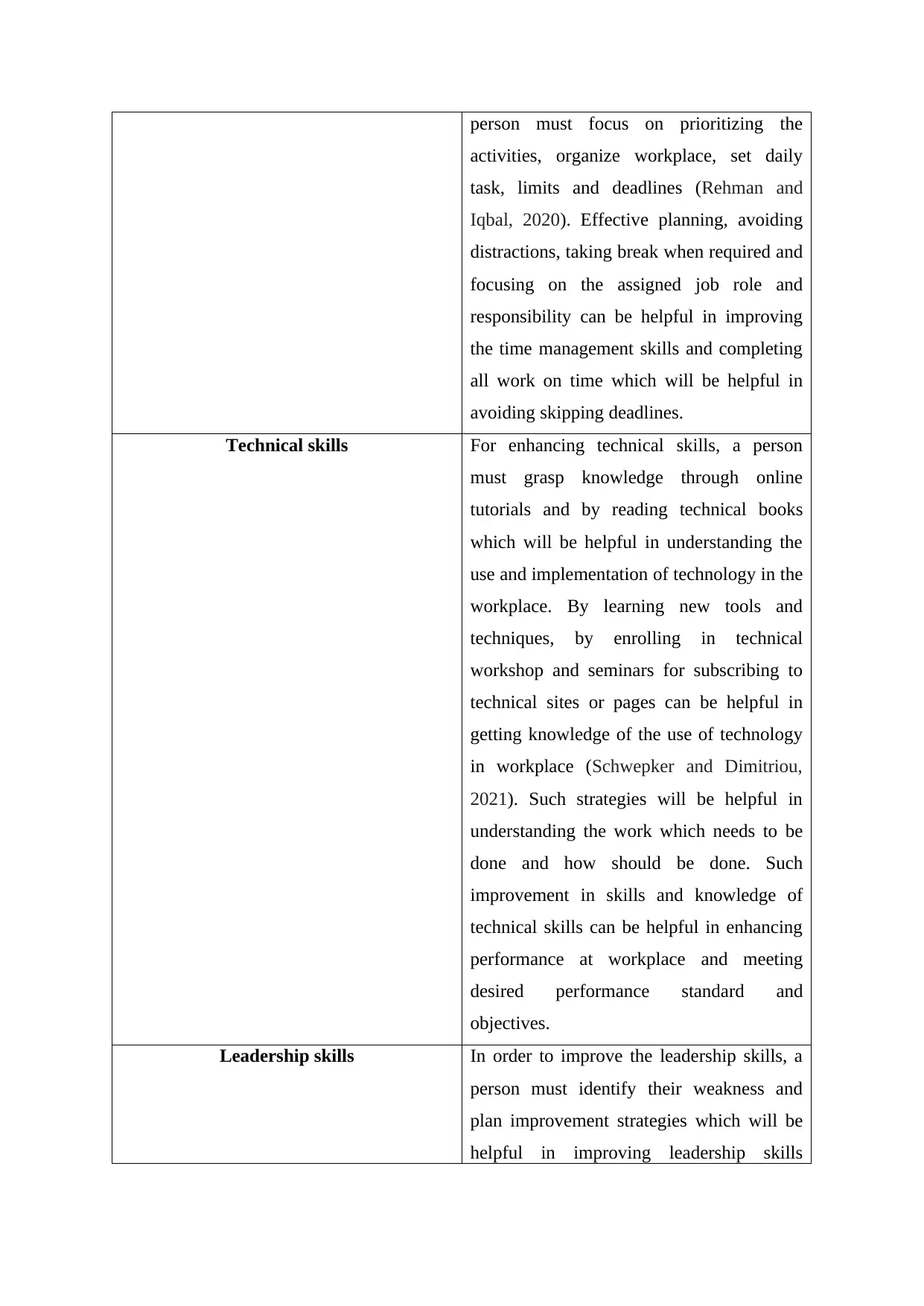
person must focus on prioritizing the
activities, organize workplace, set daily
task, limits and deadlines (Rehman and
Iqbal, 2020). Effective planning, avoiding
distractions, taking break when required and
focusing on the assigned job role and
responsibility can be helpful in improving
the time management skills and completing
all work on time which will be helpful in
avoiding skipping deadlines.
Technical skills For enhancing technical skills, a person
must grasp knowledge through online
tutorials and by reading technical books
which will be helpful in understanding the
use and implementation of technology in the
workplace. By learning new tools and
techniques, by enrolling in technical
workshop and seminars for subscribing to
technical sites or pages can be helpful in
getting knowledge of the use of technology
in workplace (Schwepker and Dimitriou,
2021). Such strategies will be helpful in
understanding the work which needs to be
done and how should be done. Such
improvement in skills and knowledge of
technical skills can be helpful in enhancing
performance at workplace and meeting
desired performance standard and
objectives.
Leadership skills In order to improve the leadership skills, a
person must identify their weakness and
plan improvement strategies which will be
helpful in improving leadership skills
activities, organize workplace, set daily
task, limits and deadlines (Rehman and
Iqbal, 2020). Effective planning, avoiding
distractions, taking break when required and
focusing on the assigned job role and
responsibility can be helpful in improving
the time management skills and completing
all work on time which will be helpful in
avoiding skipping deadlines.
Technical skills For enhancing technical skills, a person
must grasp knowledge through online
tutorials and by reading technical books
which will be helpful in understanding the
use and implementation of technology in the
workplace. By learning new tools and
techniques, by enrolling in technical
workshop and seminars for subscribing to
technical sites or pages can be helpful in
getting knowledge of the use of technology
in workplace (Schwepker and Dimitriou,
2021). Such strategies will be helpful in
understanding the work which needs to be
done and how should be done. Such
improvement in skills and knowledge of
technical skills can be helpful in enhancing
performance at workplace and meeting
desired performance standard and
objectives.
Leadership skills In order to improve the leadership skills, a
person must identify their weakness and
plan improvement strategies which will be
helpful in improving leadership skills
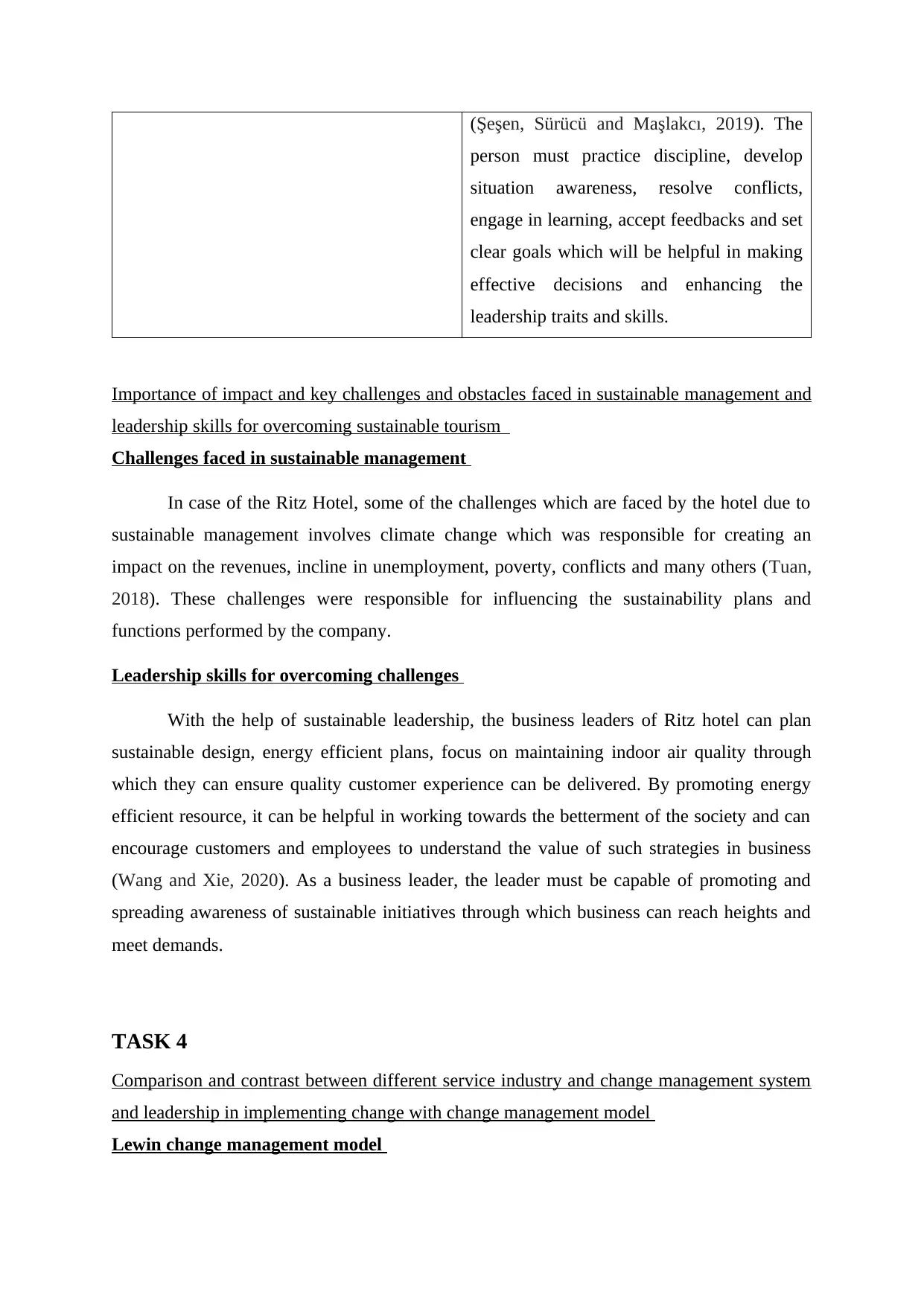
(Şeşen, Sürücü and Maşlakcı, 2019). The
person must practice discipline, develop
situation awareness, resolve conflicts,
engage in learning, accept feedbacks and set
clear goals which will be helpful in making
effective decisions and enhancing the
leadership traits and skills.
Importance of impact and key challenges and obstacles faced in sustainable management and
leadership skills for overcoming sustainable tourism
Challenges faced in sustainable management
In case of the Ritz Hotel, some of the challenges which are faced by the hotel due to
sustainable management involves climate change which was responsible for creating an
impact on the revenues, incline in unemployment, poverty, conflicts and many others (Tuan,
2018). These challenges were responsible for influencing the sustainability plans and
functions performed by the company.
Leadership skills for overcoming challenges
With the help of sustainable leadership, the business leaders of Ritz hotel can plan
sustainable design, energy efficient plans, focus on maintaining indoor air quality through
which they can ensure quality customer experience can be delivered. By promoting energy
efficient resource, it can be helpful in working towards the betterment of the society and can
encourage customers and employees to understand the value of such strategies in business
(Wang and Xie, 2020). As a business leader, the leader must be capable of promoting and
spreading awareness of sustainable initiatives through which business can reach heights and
meet demands.
TASK 4
Comparison and contrast between different service industry and change management system
and leadership in implementing change with change management model
Lewin change management model
person must practice discipline, develop
situation awareness, resolve conflicts,
engage in learning, accept feedbacks and set
clear goals which will be helpful in making
effective decisions and enhancing the
leadership traits and skills.
Importance of impact and key challenges and obstacles faced in sustainable management and
leadership skills for overcoming sustainable tourism
Challenges faced in sustainable management
In case of the Ritz Hotel, some of the challenges which are faced by the hotel due to
sustainable management involves climate change which was responsible for creating an
impact on the revenues, incline in unemployment, poverty, conflicts and many others (Tuan,
2018). These challenges were responsible for influencing the sustainability plans and
functions performed by the company.
Leadership skills for overcoming challenges
With the help of sustainable leadership, the business leaders of Ritz hotel can plan
sustainable design, energy efficient plans, focus on maintaining indoor air quality through
which they can ensure quality customer experience can be delivered. By promoting energy
efficient resource, it can be helpful in working towards the betterment of the society and can
encourage customers and employees to understand the value of such strategies in business
(Wang and Xie, 2020). As a business leader, the leader must be capable of promoting and
spreading awareness of sustainable initiatives through which business can reach heights and
meet demands.
TASK 4
Comparison and contrast between different service industry and change management system
and leadership in implementing change with change management model
Lewin change management model
⊘ This is a preview!⊘
Do you want full access?
Subscribe today to unlock all pages.

Trusted by 1+ million students worldwide
1 out of 16
Related Documents
Your All-in-One AI-Powered Toolkit for Academic Success.
+13062052269
info@desklib.com
Available 24*7 on WhatsApp / Email
![[object Object]](/_next/static/media/star-bottom.7253800d.svg)
Unlock your academic potential
Copyright © 2020–2026 A2Z Services. All Rights Reserved. Developed and managed by ZUCOL.



